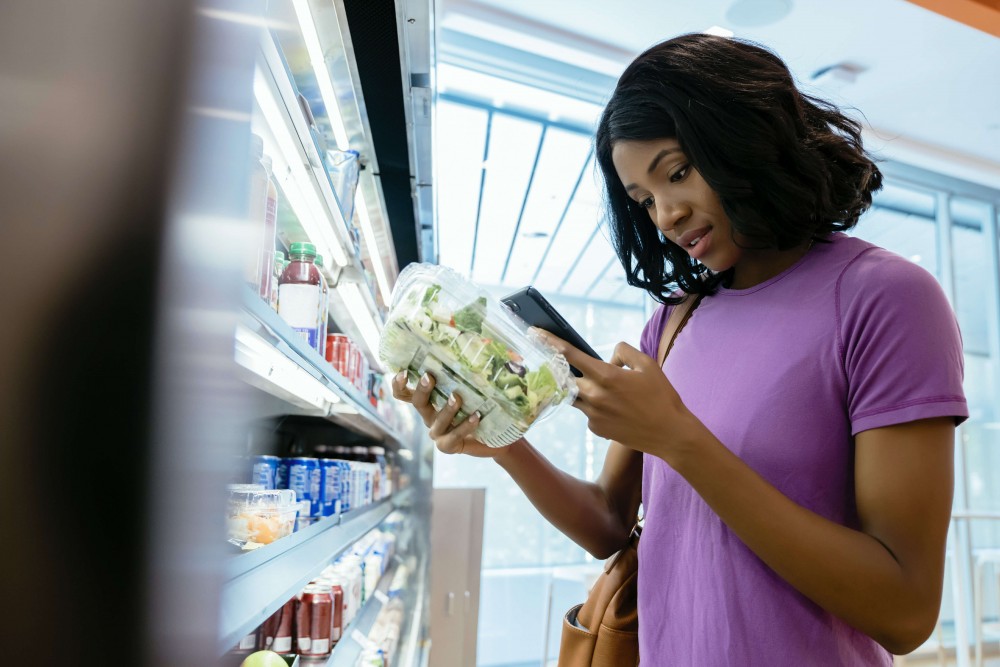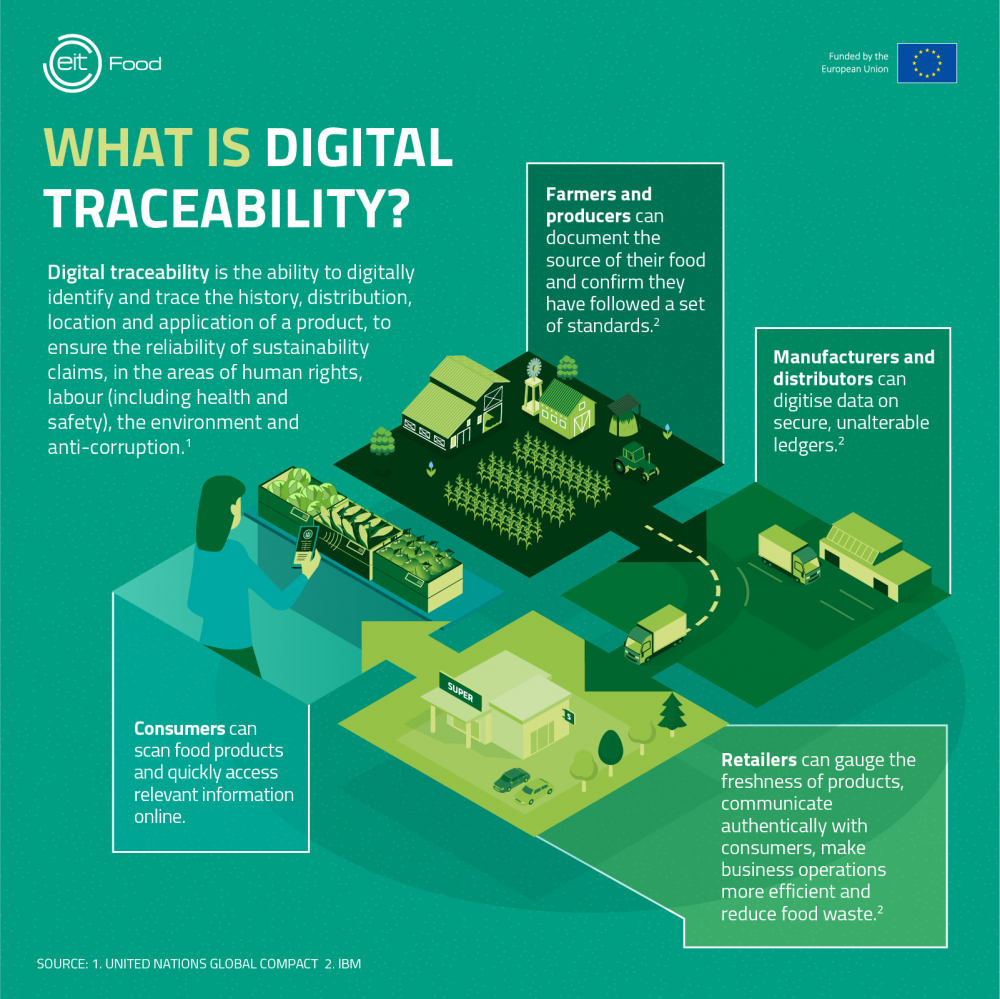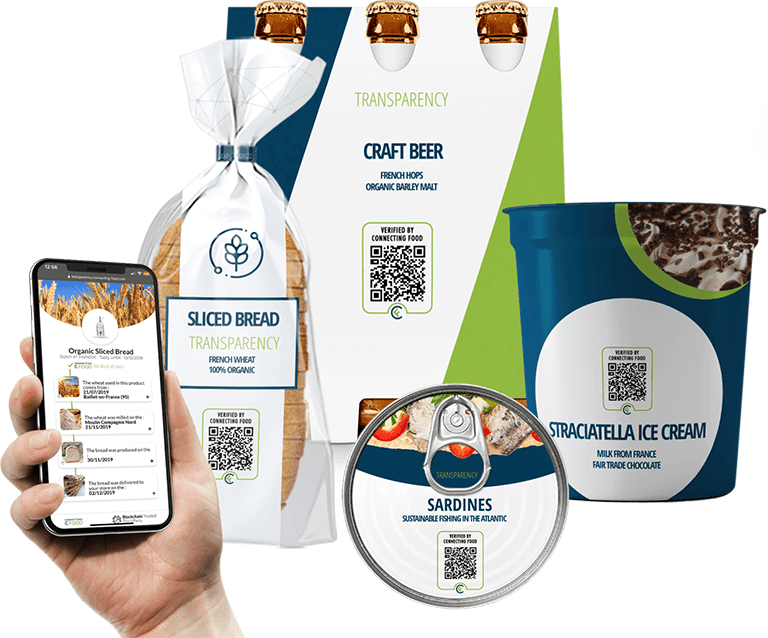How can digital traceability increase trust in the agrifood industry?
Consumer trust is vital if we are to drive positive change in the agrifood industry. Do digital traceability technologies hold the key to true transparency?

The agrifood industry is made up of countless complex supply chains. As interconnected systems of organisations, people, activities, data and resources, supply chains can present economic, social and environmental gains to involved stakeholders, but also great risks (1). Whether it be a local supply chain of fruits and vegetables in the heart of Spain, or a huge global supply chain of Chinese spices being exported to Italy, it is important to be able to track products through these increasingly complex supply networks.
Digital traceability is the process of tracking a product via digital systems, removing the risk of human error. Traceability, by definition, is the ability to identify and trace the history, distribution, location and application of a product, to ensure the reliability of sustainability claims, in the areas of human rights, labour (including health and safety), the environment and anti-corruption (2).

The benefits of digital traceability
Digital traceability can alleviate and reduce many of the agrifood sector’s most pressing risks. For example, these technologies can streamline corrective actions by quickly identifying issues as well as reduce risks associated with food safety and food fraud (1) by making it easier to track the route of a problem. They can also optimise the use and reuse of materials or resources, boosting the sustainability and cost-efficiency of the food supply chain. In fact, it is estimated that farmers who transition to using digital technologies yield around $10 in benefits for every $1 spent (3). Digital traceability technologies can also certify products to ensure only fair and sustainable goods make it to market - and that the authenticity of these products are communicated to the consumer (1).
The United Nations Global Compact defines supply chain sustainability as the “management of environmental, social and economic impacts, and the encouragement of good governance practices throughout the lifecycles of goods and services'' (4). This means that supply chain policies, programmes and traceability technologies can therefore offer key opportunities for agrifood businesses to scale up their sustainability practices and contribute to the advancement of the UN’s Sustainable Development Goals (SDGs) (5).

This is also reflected by evolving consumer demands and desires. In the recent EIT Food Trust Report, which surveyed almost 20,000 consumers across 18 European countries, consumers voiced an increased demand for supply chain transparency from farm to fork, natural products and better, more informative labelling (6). This suggests that if agrifood businesses were to scale their transparency efforts and implement digital traceability technologies, they would be directly responding to consumer demands and likely increase trust in these businesses in the process.
Consumers are also turning to more digital and online services in the wake of the COVID-19 pandemic, with 45% more shopping for food online (7). So, is now the time to be investing in digital agrifood technologies?
The barriers of digital traceability
Despite these clear benefits, there are often concerns about implementing these technologies. In order for food supply chains to become truly traceable, and for the benefits to be felt by all within the food value chain, the use of these technologies must become universal. With barriers such as price, accessibility and acceptance, the uptake of key digital solutions such as blockchain - a decentralised system for recording and protecting transactions and data - has been limited due to a lack of “technological maturity” (8). Other factors could include reluctance from smaller businesses or farms in developing countries, for example, who view the digitalisation of processes as costly and complicated (9).
There are also over 10 million farms in the EU (10). How can these technologies be rolled out so that all farms, producers, retailers, manufacturers and officials have universal access to them, and all complex supply chains follow the same standards of traceability?
Digital traceability in practice
Using technology to rebuild trust
Technology can be used to transparently relay information by removing the risk of intervention and tampering, which can build consumer trust as a result. At EIT Food, we work with a number of startups and partners innovating to grow and maintain this trust and make digital traceability the norm in the agrifood industry. For example, EIT Food RisingFoodStar Connecting Food has created a digital platform that can follow a product in real-time, tracking and digitally auditing each batch of products as they go through the supply chain.
“In the past, marketing of food has been based on a culture of secrets, and essentially hiding everything happening to food products along the value chain. Unfortunately, this has led to a lot of consumers feeling abused by brands and not trusting claims that are made about products,” explained Coline Laurent, Marketing and Communications Manager of Connecting Food (11), which she said technologies such as blockchain can help to alleviate.

Image source: Connecting Food
Talking to EIT Food on a Food Fight podcast episode (12), the Co-founder of Connecting Food, Maxine Roper, added that, “consumers do want more transparency, but brands and retailers are not able to do that today because supply chains are so complex and the systems that actually manage them are fairly obsolete.” She explained that the information consumers want is too much to physically fit on food labels, so digitally enabling this through QR codes, for example, means that brands are more able to tell a full, authentic story behind a product. This would allow brands to communicate “where it comes from and who made it, connecting [consumers] back to the people that are actually behind that particular food product.” (12)
Connecting Food has raised around €5 million since its creation in 2016 and is planning to accelerate its technological and commercial development in the coming years.
Another project focusing on digital traceability is The Digital Twin Management System by EIT Food partners Siemens, Givaudan, Fraunhofer, Strauss and the Technical University of Munich. The project aims to make food production more transparent and more sustainable by giving an overview in the production and logistic processes.
The Digital Twin Management System creates ‘digital twins’ - digital footprints of products, their production and their lifecycle - which make it possible to find out detailed information about the product as it moves through the food supply chain. The project has been focused around the development of software solutions for the management of these digital twins.
The team has been working to enable software to collect and share information relevant for food production. This has involved development of the functionality of the platform and tools to analyse and manage the data. These tools work like apps and can be added to the platform to enhance its functionality for users.
“We can utilise technology to help make food systems become transparent, safe, efficient and sustainable. Technology such as specialised IT systems and platforms enable us to do this by improving the availability of information about food and its production across the whole value chain.”
The digital era of the COVID-19 pandemic
Another startup in the EIT Food RisingFoodStars Association helping brands to connect with consumers - through QR codes - is ScanTrust. On a Food Fight podcast episode (13) Ricardo Garcia, ScanTrust’s Head of Partnerships and Blockchain Advisory, said that he believes consumers should have the ability to learn more about the products they are buying, and that the agrifood industry has a duty to offer this to them.
“At ScanTrust we are focused on enabling brands to build trusted communications channels with their consumers and restore the trust that the food industry has been losing over the last couple of years. We do this by enabling food and beverage brands to give each of their products a unique QR code on their packaging, allowing them to associate information with specific products,” Ricardo explained (13).
He argued that there has been a structural loss in trust for food brands - particularly with millennials - but the COVID-19 pandemic has presented a unique opportunity for digital traceability technologies to become the norm and boost trust. “Masses of consumers have got used to using QR codes [during COVID-19] which has made it a lot easier to talk to brands about using QR codes on food packaging,” he said. “What’s next for us is to capitalise on this wave of adoption.”
DNA testing to improve supply chain safety
SwissDeCode, an EIT Food RisingFoodStar, is a scaleup using another form of digital traceability to optimise food supply chains. The Swiss company helps food producers to grow and supply food that is safe to eat by delivering real time certification of authenticity, safety and quality of products, processes and premises.
SwissDeCode’s DNAFoil® technology allows farmers, food manufacturers and other agents in the food value chain to quickly detect soil, animal and plant diseases, as well as food contamination or adulteration, on the spot and without long lab delays. This form of rapid, on-site testing means that processes can be streamlined, and risks can be reduced. Once this data is digitally secured and the food product enters into the supply chain, stakeholders further down the line, including consumers, have access to the information, giving them confidence that the products are safe, authentic and traceable.
SwissDeCode recently closed its first venture round led by VisVires New Protein (Singapore) and EIT Food to accelerate the development of its technology. “Our solution will deliver a user experience equivalent to making an espresso coffee, and a certificate equivalent to those issued by laboratories,” said the CEO and Co-founder, Brij Sahi. The automated system aims to provide ISO certified results in just 30 minutes compared to current processes which can take up to seven days.
Is the future of traceability digital?
Traceability would have once been a simple process where local farmers and markets were trusted by small villages and towns, but in the globalised world as we know it today, food brands and corporates now face the challenge of producing for the mass market whilst maintaining integrity and consumer trust.
The EIT Food Trust Report revealed that trust for retailers - the primary point of contact in the agrifood industry for many consumers - is indeed growing, but there is still more work to be done. The study found that consumers acknowledge that many retailers are actively trying to adjust to consumer needs but stressed they want retailers to be clearer on their criteria for food products and increase their supply chain transparency (6). This presents a clear opportunity for retailers to embrace these consumer demands and act in the public interest by potentially going digital.
Government authorities, manufacturers and farmers also have work to do to build consumer trust. The findings of the Trust Report suggested that online platforms to meet and engage with farmers, for example, could increase trust and confidence from consumers (6) – a digital step in the right direction perhaps.
Overall, trust is increasing (6), and it is important to remember that transitioning to digital traceability is a process. Studies such as the EIT Food Trust Report, available for download online, are crucial if we are to truly understand what needs to change in the agrifood industry to build trust and, in turn, drive positive change.
You can learn more about these topics via our free online courses and keep up to date with the latest debates about trust, digital traceability and more on the Food Fight podcast and FoodUnfolded, EIT Food’s digital platform designed to reconnect people with their food and empower them to change our food system for the better.
Further reading
- FAO: The role of digital technologies in livestock traceability and trade
- Food Navigator: Future-proofing our food for a healthier and sustainable world
- EIT Food: Farmers chosen as most trusted group within the food sector by European consumers
- WEF: Accelerating sustainable production through digital traceability
- EIT Food: What is the state of consumer trust in the European agrifood industry?
References
- WEF: 5 ways traceability technologies can lead to a safer, more sustainable world
- United Nations Global Compact: A guide to traceability
- Science: Realizing the potential of digital development: The case of agricultural advice
- United Nations Global Compact: Supply chain sustainability: a practical guide for continuous improvement
- WEF: Innovating with a purpose: Improving traceability in food value chains through technology innovations
- EIT Food: The EIT Food Trust Report
- EIT Food: EIT Food report reveals lasting impact of COVID-19 pandemic on European food behaviours
- FAO: E-agriculture in action: Blockchain for agriculture: opportunities and challenges
- Science Daily: New research sheds light on the reluctance of farmers to adopt new technologies
- Eurostat: Agriculture statistics – family farming in the EU
- EIT Food: Trust through transparency: Connecting Food to the consumer
- EIT Food: The Food Fight Podcast: Connecting Food on blockchain transparency in the food system
- EIT Food: The Food Fight Podcast: Spotlight: ScanTrust on reconnecting with consumers
More blog posts

POWERED BY A PARENT’S LOVE

Connecta2Invest: connecting capital with agrifood tech innovation
